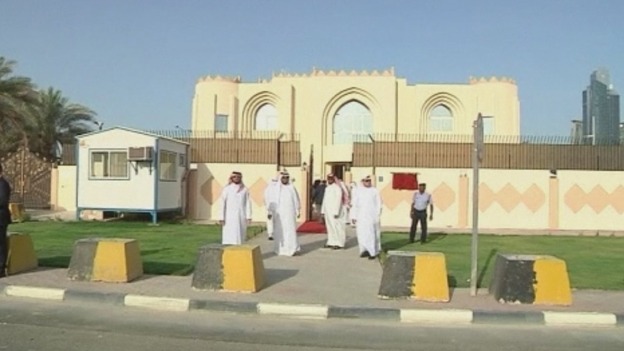by Giorgio Cafiero
In 2013, with support from the American, Afghan, and Qatari governments, the Taliban opened an office in Doha. The office was to serve as a platform to engage the Taliban’s representatives in talks to bring peace to war-torn Afghanistan. Yet over the past four years, the office has failed to meaningfully advance any successful negotiations. At this juncture, with Donald Trump’s administration making diplomacy in Afghanistan a lower priority, Washington and Kabul are pressuring Doha to eject the Taliban’s envoys from Qatar.
Officials in the United States and Afghanistan have recently argued that an office in the emirate’s capital has only provided the Taliban with “unfounded legitimacy” and the means to engage the Chinese, Iranian, Pakistani, and Russian governments via Doha. Trump has strongly opposed the Taliban office as a failed initiative of the Obama administration. Saudi Arabia and the United Arab Emirates (UAE), viewing the 36-member delegation as a way for Doha to enhance its prestige in the global arena, have also called for ejecting the Taliban’s office from Qatar.
The Trump administration and Afghanistan’s embattled president, Ashraf Ghani, however, should consider the risks of shutting down the Taliban’s office in Doha. Access to a channel of communication with the Taliban affords Washington and Kabul the maneuverability to engage the Taliban when they decide the time is opportune. Any realistic plan to promote peace in Afghanistan will require negotiating with the Taliban despite its crimes. Additionally, if the Taliban’s envoys are ejected from Qatar, they might simply locate to another country—possibly China, Iran, Pakistan, or Russia—where Washington would lose leverage in any peace process.
Furthermore, the closure of the Taliban’s office in Doha would further dim the prospects for conflict resolution in Afghanistan by empowering those within the Taliban leadership who oppose diplomacy and favor a continued insurgency. Most recently, on October 18, the Taliban attacked an Afghan Army base in Maiwand, Kandahar province, resulting in the death of nine Afghan soldiers and 10 militants from the group. Unquestionably, the narrative among some in the Taliban that officials in Washington and Kabul are not genuine when they call for a mediated solution will gain momentum if the Trump administration and Ghani’s government pressure Qatar into closing the Taliban office.
Sponsor of Terror or Useful Diplomatic Backchannel?
Since the 1990s, Qatar has maintained relations with a host of Islamist individuals and groups that are ideologically anti-Western. Scores of factions that the US State Department has designated as terrorist organizations, from Hamas in Gaza to the al-Nusra Front in Syria, have received various forms of support from Doha, which has also hosted members of these organizations. In Washington there has been a longstanding debate about whether an alliance with an Arab state that fosters such relationships with various Islamists advances or undermines US interests.
Although some American lawmakers are quick to point their fingers at Qatar for maintaining links with certain Islamist factions in the Middle East, Washington has also taken selective advantage of Doha’s relationships with various anti-Western groups. Washington has used Qatar as a diplomatic bridge between the US and its Western/Middle Eastern allies on one side and such non-state actors on the other at times when direct communication was not viable for political or legal reasons.
For example, Qatar’s diplomacy during the Israel-Hamas war of 2014 helped push the two sides to agree to a ceasefire, which advanced US interests at a time when US law prevented Washington from engaging Hamas directly. That same year, Doha played a pivotal role in convincing the al-Qaeda-affiliated al-Nusra Front to release Peter Theo Curtis, an American journalist whom the extremist group took hostage in Syria in 2012, and Qatar coordinated negotiations that led to the “Taliban Five” prisoner exchange, which secured Army Sgt. Bowe Bergdahl’s release.
Future of Taliban Office in Qatar
If the White House is seriously committed to promoting peace in Afghanistan, a long-term diplomatic initiative is required. As more Afghans question Washington’s credibility to broker a political settlement, the Trump administration’s pressure on Doha to expel the Taliban office could further undermine US efforts to play a lead role in the peace process.
Ultimately, the decision to close the Taliban office in Doha falls to the Qatari authorities, even if Afghanistan’s government would have to make the formal request. When Emir Tamim came to New York last month to address the United Nations General Assembly, the Qatari emir reportedly spoke with Trump about the office. Although it is unclear whether Emir Tamim has already made the decision, the months-old Qatar crisis has increased the emirate’s leadership’s determination to convince the Trump administration that the blockading countries’ accusations of Qatar sponsoring terrorism are unfounded.
Thus, while Qatar may find that closure of the Taliban office offers the leadership in Doha an opportunity to strengthen its relationship with Trump, who initially backed the Saudi/UAE-led bloc in the Gulf dispute, such a move could easily dim the prospects for the Afghan war’s peaceful resolution.
Photo: Taliban office in Doha.






“If the White House is seriously committed to promoting peace in Afghanistan. . .”
Unfortunately, the US is not seriously committed to promoting peace anywhere. War pays so much better!
There is no substitute for victory, except failure which is where the US is headed. The Taliban are well on their way to victory in Afghanistan, so Qatar doesn’t matter. There’s nothing to negotiate.
–recent headlines:
>US kills influential Pakistani Taliban leader in Afghanistan
>Taliban overruns Afghan army camp in Kandahar
>Taliban overruns 3 districts in southern Afghanistan
I was about to say exactly what donbacon writes!
The USA scorns diplomacy, refuses talks except with “allies” like Israel, and especially when it really is urgent like DPRK, which has wanted a peace treaty and non-aggression from the USA since the 1950s; and instead gets the Trump.
“Jaw-jaw, not war-war” could make all the difference IF peace is considered desirable!!